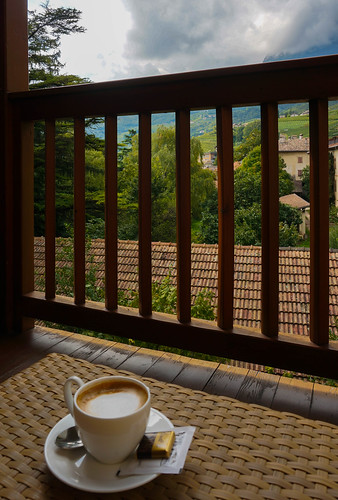
The view is of the mountains and vineyards. There are a number of clouds, but the air feels wonderfully warm. Somewhere in the seventies, I'd say. We're on a slope and the valley carries sound well, so that in addition to the occasional car, I hear a stream pouring down from above and the noisy crow of a rooster. A child shouts out. A parent calms her.
I'm thinking -- if I had known September travel was this good, I may have been tempted to retire years ago.
It is, in other words, a confluence of all things that I find beautiful and quite spiritual, really. It's easy to be happy when you don't have to work at eliminating any of the irritants that so often threaten to spoil a day. The mosquitoes of our existence, so to speak.
Finding time to write and to work on photos and to fill each day with the walks I love is a challenge, but Ocean readers are very forgiving and if I spend more time on photos than on words (or vice versa), or if I give you too much of what I consider beautiful (and you might consider boring), I know you'll just scroll down and cut me some slack.
And you know by now that I find vineyards beautiful. Yes, there's the wine -- not a small bonus! -- but it's really more the expanse of vines, so well tended, producing beautiful clumps of grapes on often rocky and unforgiving terrain -- I just find it so gorgeous to behold and I could not be at a better time for it than now, when the harvest is just beginning, so that the ripeness all around me is obvious, at the same time that the vines are not yet stripped bare of their most beautiful fruit.
Yes, you guessed it. There will be numerous photos from the vineyards.
But let me start with waking up, way too early, excitedly opening the window to the view...
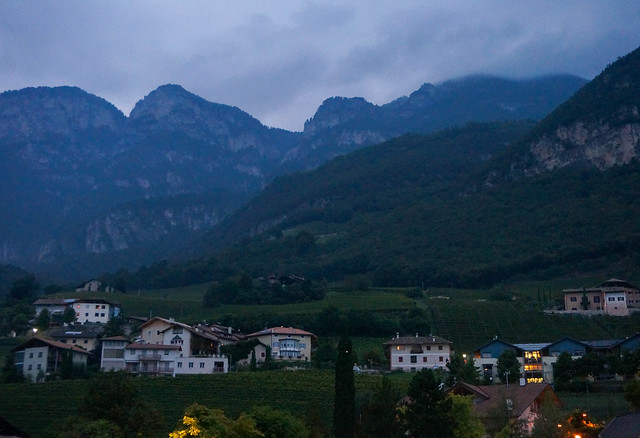
... and then, of course, breakfast. I come down at 9 and I see that most have eaten already. I'm not surprised. When I asked Frau Pomella (the innkeeper's wife) where their guests come from, she said without hesitation: Germany. Also Austria and Switzerland, but predominantly Germany. If I may indulge in stereotypes - I think of Germans as being very punctual people.
I hadn't quite caught on that I could eat outside, but no matter. My table is by the window.
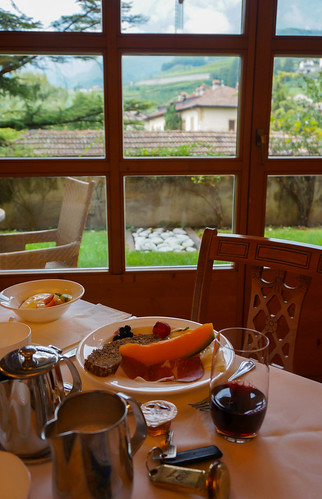
As usual, I stray from my regular eating habits when I travel. Melon and prosciutto. Tomatoes and fresh mozzarella. Regional cheese and dark bread. With blackberry jam and a Bolzano honey. Grape juice to drink. Oh, fine -- also granola with yogurt and fruit and coffee. Yes, enough food to keep me happy until dinner.
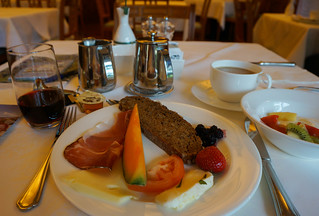
The innkeepers recommend that I break the day in two: in the morning, I can take one of the many paths to the village to the north (Tramin) and in the afternoon, I can join a group tour that is unusual in that it hikes to the village to the south (Entiklar), studying the grapes and then sampling corresponding wines at a variety of wineries here.
I have to give a short wistful description of how easy it is to visit a place like this: the inn, in addition to feeding everyone so very well, gives each guest a card that is a free pass to all the regional attractions: tours, museums, wine tastings, buses, trains -- everything. It's like Disneyland, where everything is included except this is just a series of villages that have banded together to make things easy for people who come here. Get out of your cars already! Walk, explore, catch a bus here, return by train from there, join this group, go here -- it's all on us! What an incredibly wonderful concept!
So I walk to Tramin, where I stumble upon the world famous Elena Walch winery and, too, an 18th century frescoed church and only when I see that it' getting awfully close to 2, do I catch the small local bus back to Kurtatsch. But do, please take this walk with me, because it really is gorgeous on these quiet, west facing hills!
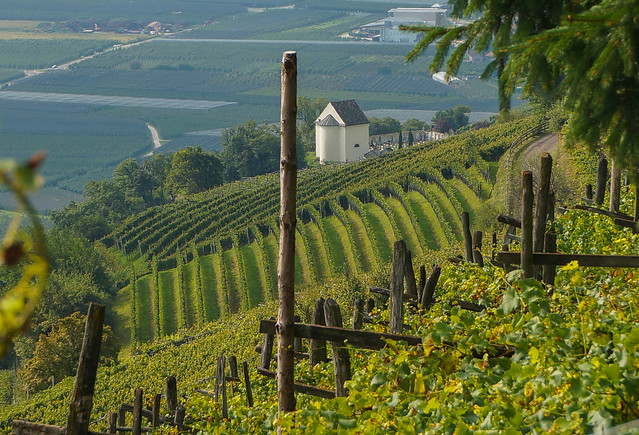
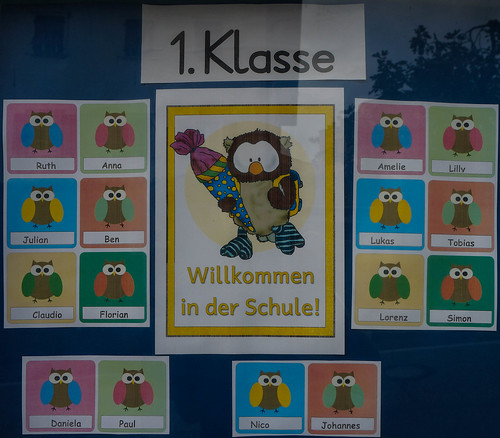
(whatever they're feeding the kids here must produce more boys than girls; take a look at this posted list of first graders in the village: eleven boys and five girls.)
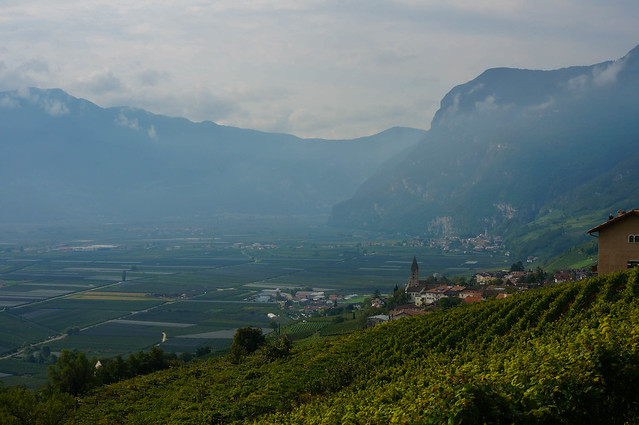
(the village, looking back)
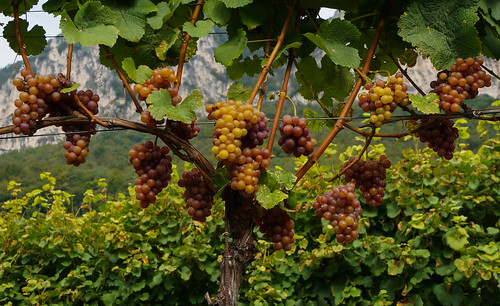
(probably the gewurztraminer grape)
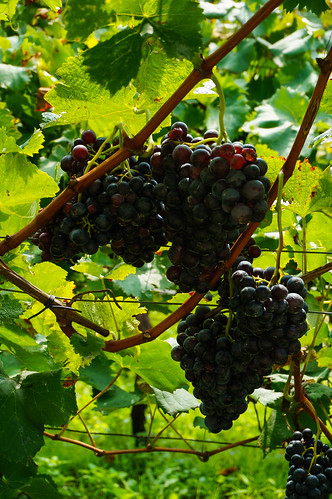
(probably the unique to here lagrein grape)
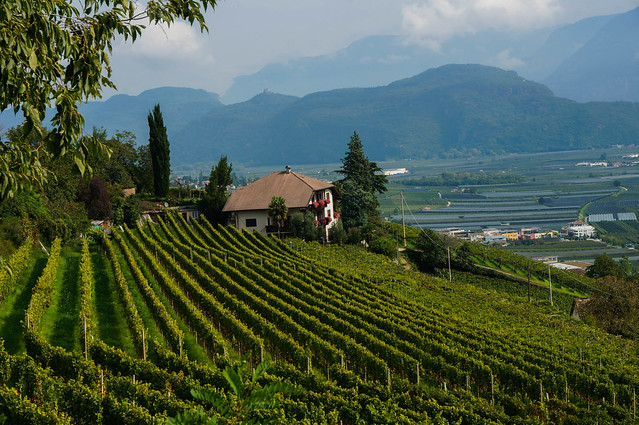
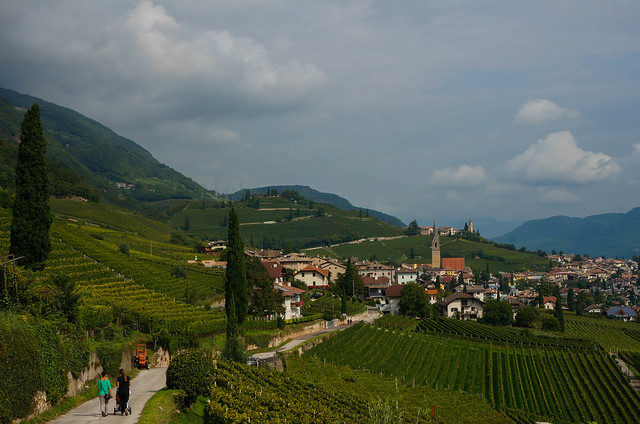
(approaching Tramin)
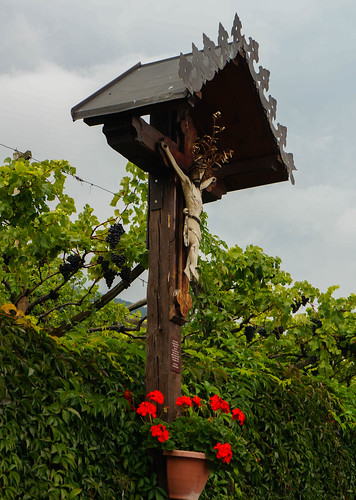
(very common: the cross and the geranium and, of course, the grapes)
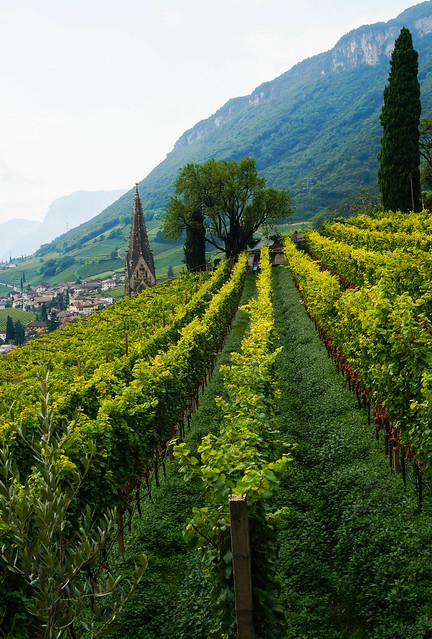
(looking back at Tramin)
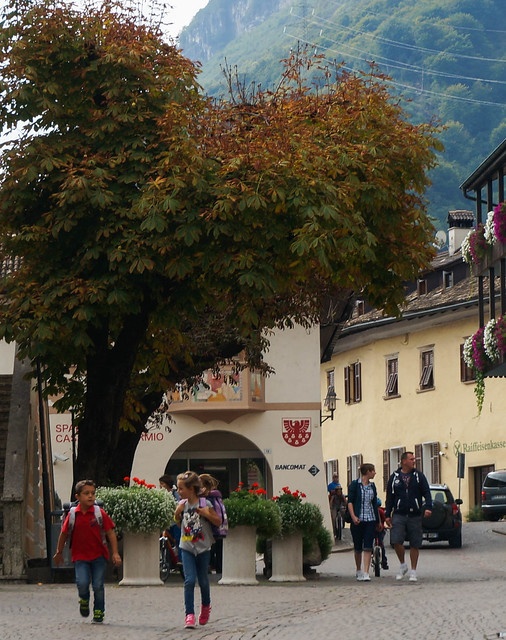
(catching a bus on the square; school children home for lunch)
At 2 p.m. I meet the small group of Germans (11 plus me) for the walking tour of the vineyards. Two things ought to be said about them: they are spry. All in hiking shoes. Fit and ready to go. Okay, I can handle it!
Second point: I show up at 1:59. They're all waiting for me. What did I say -- punctual.
I learned so much during this actually 4.5 hour walk! So much!
First of all, the guide, Margaret (a tad younger than me, born and raised in this village) speaks German fluently, Italian haltingly (she tells me that in her school years, it was all German; only recently have they started the kids on Italian from the early grades and English from the middle grades), and English not at all.
The walking tour is in German because, as I noted before, it's the Germans who come here. Repeatedly. (From my group, four had done this same tour just last year. They love the Alto Adige. I am not surprised -- there is a lot to love.) But this is how it worked in the end: Margaret spoke her bit in German. Then, as we walked, she did the best she could just for me, in Italian. Between her imperfect Italian and my imperfect Italian, I basically got some 75% of what she tried to convey. The Germans, who spoke no Italian, but spoke quite good English, helped with the missing 25%, though they were all stumped on how to translate nelke. It turns out it's the spice clove, whose nose is very present in Moscato Giallo.
Again, do walk with me. There's probably way too much info here about vineyards, but I have to say, it was such a splendid walk, with numerous tastings, stories, vistas -- all in the beautiful afternoon warmth of a mild autumnal day. With one American of Polish descent, eleven Germans and one Italian who is proud as anything of her Italian Alto Adige terroir (forgive the French) even as she is most at home with her German.
First, a few reminders: Kurtatsch is on the wine route (weinstrasse), in the heart of the Alto Adige. But, though Alto Adige wines are adored by the Italians, and the Germans, and to some extent the Americans (you may not have noted it, but if you you're at all a white wine enthusiast, you will have had a wine from this region in your lifetime), the Alto Adige produces only 0.8% of all of Italy's wine. (That speaks to how much Tuscany, Sicily, the Piedmont, etc etc flood the wine markets.) So we're talking small, select and 60% white.
We set out for the wine trail. (A spry bunch, I tell you!)
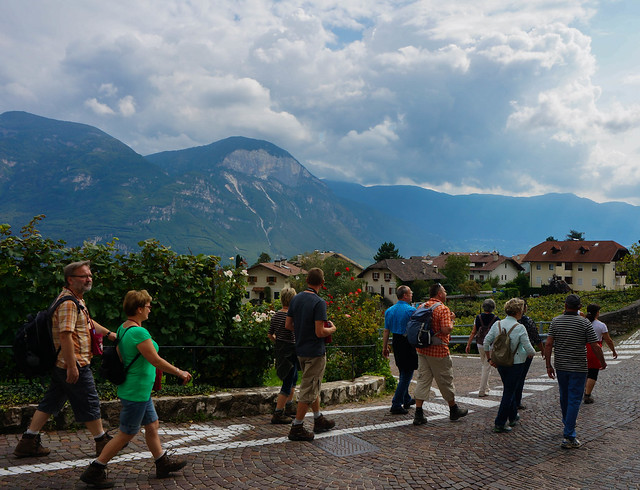
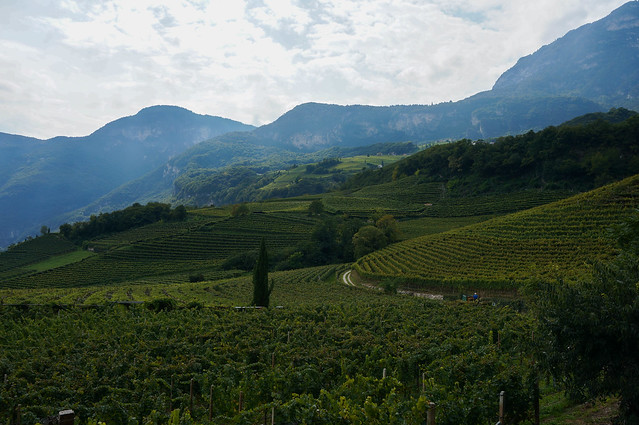
Our focus is on wines of the Kurtatsch vineyards (a subset of Alto Adige wines). Alto Adige grapes are mostly (i.e. 70%) used for big house wines (remember Elena Walch?), with private houses hanging in there at 5%, and coops churning out the rest. Our tour concentrates on the private houses and finishes off with the coop cellars. For our group of twelve people, in the course of the 4.5 hour tour, Margaret will have emptied out 7 bottles of good wine. For those of us supplied with a regional pass -- all this is free.
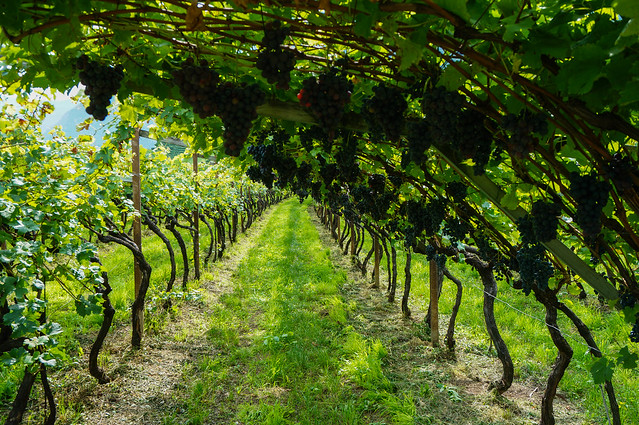
(very unusual these days pergola style cultivation)
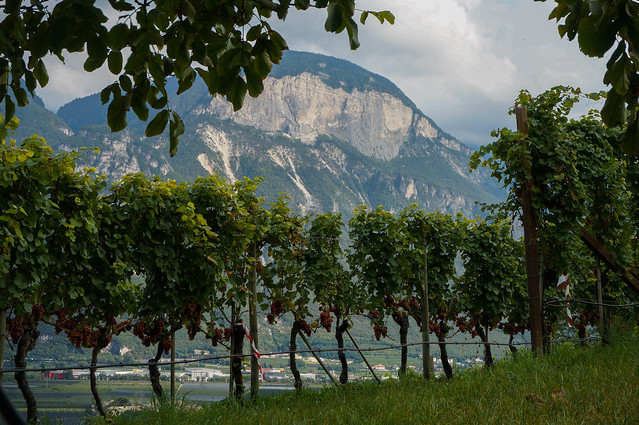
(more typical: the upright training)
Along the wine route, there are stations of the smell. I know. Sounds weird. The premise is that you have to use three senses to appreciate wine: taste, sight and smell. Each grape grown in this region (there are 13 last I counted, from Pinto Grigio to Pinot Noir, from Gewurztraminer to Moscato Giallo, etc.) -- has a smelling station, where a tiny clay pot is infused with aromas you should recognize in a given grape. We pause, smell, make guesses as to what it is, then learn more about the essential characteristics of each variety.
So this is what we do. Hike, smell, listen, occasionally taste.
But a pride in one's region has to include here the valley's other bounty. If the vineyards span the steep mountain sides, the flat land at the base is the apple cart of Europe: it is the largest concentration of this fruit on the entire continent (step aside, Normandy in France!). At the head of the pack is golden delicious, followed by pink lady, gala and honey crisp. (It took some smarts to translate the varieties!)
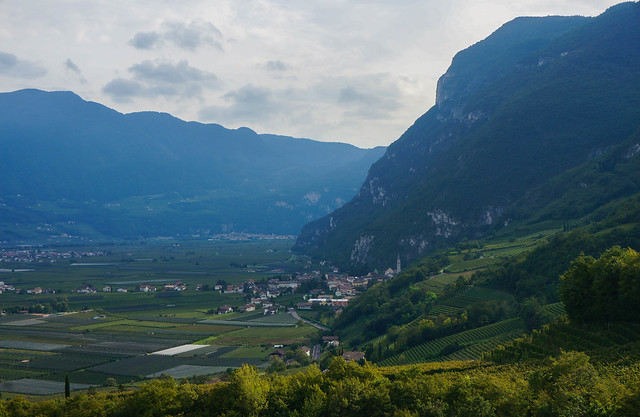
(the valley below)
Alright. That was a pause. Very quickly, it's back to the vineyards. Things to take note of: first, growing grapes here is terrifically labor intensive. Whether grown in pergolas or in upright rows, the vines are clipped, trained and then often pruned of leaves at the bottom so that they look like ladies in ballet skirts of dainty grapes.
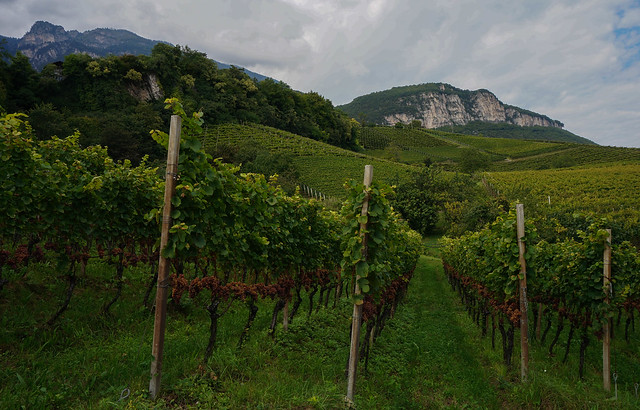
All by hand. Harvested that way too.
I ask -- who do you bring in for this seasonal job?
She answers -- Poles, also Slovaks and Czechs.
Huh. Yay EU.
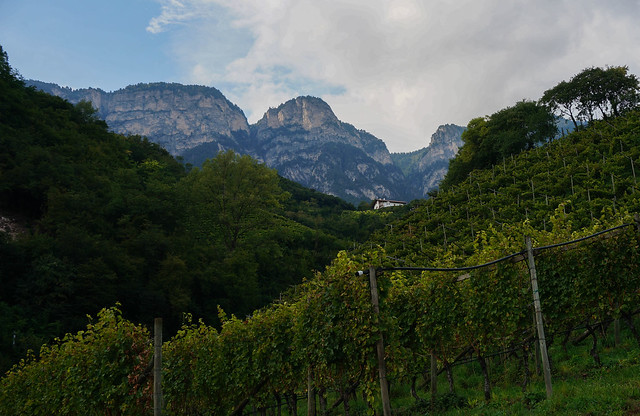
Toward the end of the tour, we are in a wein garten of a very old, family owned wine house (Schloss Turmhoff, owned and managed by the Tiefenbrunner family). There is the usual discussion of history, of taste, of smell. When we get busy with our swirling, sniffing and sampling, Margaret walks over to an old gentleman sitting off to the side of the activity, with a book and a blanket wrapped loosely around his legs. I ask her later if all this -- I wave my hand over the winery -- is his.
Yes, she says. He's the Padrone. But he's sick now.
All the vineyards in the world cannot make you happy if you're not feeling well.
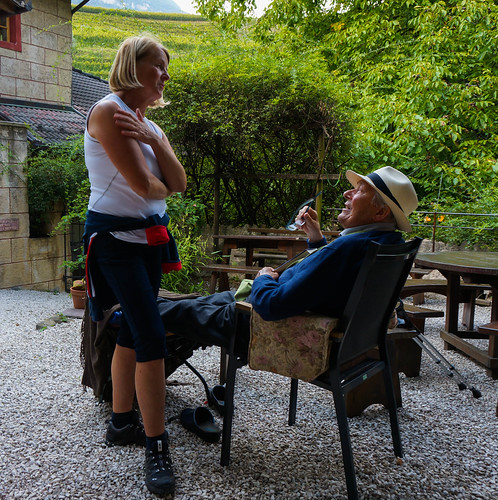
Margaret had told him she had in her group an American -- newsworthy only because we're in a garden with maybe a total of 50 visitors, all of them, so far as I can tell, German. As we leave, I pause just to say something nice about the experience of drinking his wines. I choose English, But I can tell by his friendly if sad smile that Italian would have worked better.
We are back now in Kurtatsch, in the cellars acquired by the commune of Kurtatsch, used for storing the commune's finer wines. Margaret serves her best for last -- a merlot and cabernet combo that you wouldn't necessarily associate with this region, even as it is, in fact, superb.
Or is it that the whole day is so very fine? Back home, I don't drink red wines much, but like whisky in Islay, red wine is different for me if sampled at a vineyard. The energy is palpable, the breeze dances silly dances around in my head, the nose rises from the glass -- it's all such a splendid experience!
...Even though I know it wont carry over to home. It's no use even trying. Unless you plan to open a bottle with someone who is willing to be transported for the moment to the place of the wine's birth (and not drinking merely for the sake of imbibing), it's really pointless taking it with me. In Islay, I'll smile at the dram served at breakfast, in Alto Adige I'll swirl the glass and think it's the most glorious wine on this side of the planet, but still - I'll take back all that I learned, but the wine will remain here.
Dinner at the Inn tonight feels more German than Italian. Maybe it's the salmon with horseradish and creamed potatoes. Or maybe I'm just steeped in German right now. Even as I'm in Italy. Without the Italian, but still, at the core, so Italian. [I suppose in the same way that "No" advocates in tomorrow's Scottish referendum will urge the voters to recognize that Scotland is so Scottish that it hurts, but at her core, her feet are rooted in the UK.]

